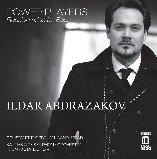Ildar Abdrazakov is the man of the hour or maybe the whole month. The bass is on the cover of the February issue of Opera News. He is currently starring in the Metropolitan Opera’s new production of Prince Igor. To coincide with the opening, Delos has just released his first solo recording, “Power Players,” comprised of arias from Russian operas.
Though one might assume a Russian singer would naturally gravitate to roles in his own language, Abdrazakov’s career hasn’t progressed that way. He made his international reputation mostly by singing Italian and French operas. At the Met, he has sung Verdi’s “Attila” and Berlioz’s “Damnation of Faust.” He portrayed the title role in the first and was Mephistofeles in the second. He has also played the Devil in Boito’s “Mefistofele” and Gounod’s “Faust.” He may have leading man looks, but composers tend to think of deep voices as representing evil. In any event, besides delivering the goods vocally, he has the charisma required for these Satanic parts.
Abdrazakov started performing opera in his native Russia, where he won prestigious awards. His international career took off after he won the Maria Callas International Television Competition in Italy during 2000. He made his debut in “La Sonambula” at La Scala the following year when he was only 25 years old and quickly established himself as one of the world’s leading basses. He is married to the outstanding Russian mezzo-soprano Olga Borodina and they frequently perform together. They co-starred at the Met in “Damnation of Faust” and “Khovanshchina.” The latter marked the first time Abdrazakov had appeared in a Russian opera outside his native country. The husband and wife won Grammy’s for “The Best Classical Album” and “The Best Choral Performance” for their recording of Verdi’s Requiem, conducted by Riccardo Muti.
The bass prepared “Power Players” as a companion to his Prince Igor, a significant event since it is the first revival of the opera at the Met since 1917. The album title comes from the fact that the characters are often embroiled in wars or internal battles for power. The protagonist of Glinka’s “Ruslan and Ludmila” is on his way to fight a battle to save his wife from her kidnapper, Prince Igor is captured by the enemy during battle, Varlaam in “Boris Godunov” sings about Ivan the Terrible’s war with the Tartars and the title character Boris is presented in his Coronation Scene.
Field Marshall Kutuzov in Prokofiev’s “War and Peace” is forced to retreat from Moscow, leaving it to the French forces while Ivan Susanin in Glinka’s “A Life for the Tsar” is singing of his impending death by the enemy army. There is a more domestic tone in the Tchaikovsky arias: Prince Gremin in “Eugene Onegin” sings of his happy marriage and King Rene in “Iolanta” pleads for God to save his blind daughter.
Throughout the CD, Abdrazakov produces a luscious tone and injects a panoply of colors depending on the character or the situation. He gets into each role, whether he is a tyrant, a patriot or a worrying parent. The breath control that made his bel canto roles so effective is apparent here as well. My only qualification is that his voice lacks the darkness that I prefer in some of these parts. The singer I most often turn to in this repertoire is the late Bulgarian bass Boris Christoff. However, Abdrazakov is only 37 year’s old and his voice is darkening with age. When he is ready, his Boris Godunov should be formidable. Despite this quibble, “Power Players” is beautifully sung and contains some of the most famous arias by Russian composers. The singer is well accompanied by Lithuania’s Kaunas City Symphony and Kaunas State Choir under the baton of Constantine Orbelian (an American who has had an impressive career in Russia).
Abdrazakov is appearing at the Metropolitan Opera in “Prince Igor” intermittently through March 8th.






